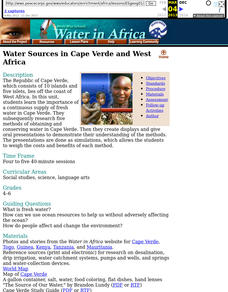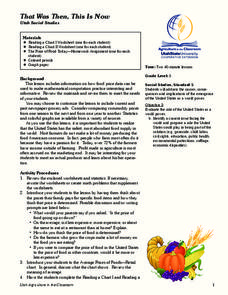Curated OER
Water Sources in Cape Verde and West Africa
Young explorers study the scarcity and importance of a continuous supply of fresh water in Cape Verde. They research the five main ways that fresh water is obtained in these countries. Each research group prepares a presentation, and...
Curated OER
Agriculture- It's More Than You Think
Learners research careers in agriculture. In this agricultural lesson, students discover the various careers related to agriculture. Learners construct resumes and "apply" for agricultural jobs.
Curated OER
Who In the World Is Hungry?
Middle schoolers identify the scope of hunger throughout the world. Using United States data, they discover why hunger is important to the United States and its agriculture. They identify goals of sustainable development and food...
Curated OER
Giving Beyond Measure-- Diary of Anne Frank
Young scholars examine the philanthropic concepts and values in the play, "The Diary of Anne Frank." They read the play, role-play characters, create a poster, and write journal entries.
Curated OER
Market Simulation
Students explore the role of markets in Asian countries. They bring items from home to barter with to simulate markets. They discuss the advantages and problems of exchanging and how price is determined.
Curated OER
That was Then, This is Now
Students compare and contrast data charts and statistics for food prices of now and in the past. In this food prices lesson plan, students answer short answer questions and calculate computations.
Chicago Botanic Garden
Climate Change Impacts on Ecosystem Services
The fourth activity in a series of five has classes participate in a jigsaw to learn about global impacts of climate change and then share their new information with a home group. Groups then research impacts of climate change (droughts,...
Curated OER
Recycling and Composting
Learners set up composting sites that allow food scraps and paper to be recycled by nature. They are introduced to one aspect of recycling; composting. Students see how God recycles as the worms change garbage into something that brings...
Teach Engineering
Energy Intelligence Agency
Protect the world from energy depletion—join the Energy Intelligence Agency. Using a set of cards, pupils distinguish between correct and incorrect information regarding energy use in the United States. They analyze graphs and diagrams...
Ocean Explorer
Architects of the Coral Reef
Coral Reefs are the focus of a life science lesson plan. Upper graders look at how coral reefs are formed, how the animals and plants reproduce, and the variety of ways that humans benefit from coral reefs around the world. Groups of...
Curated OER
Fruits and Vegetables
Students make a variety of recipes that include fruits and vegetables. In this fruit and vegetables lesson plan, students make recipes, learn about the proper amounts of fruits and vegetables needed per day, describe how to sanitize...
Curated OER
Hey, Mom! What's for Breakfast?
Students examine how he world eats breakfast. In this food choices lesson plan, students work in groups to list breakfast foods and their ingredients and find goods and consumers on the list. The, students use the Internet to complete...
Curated OER
The State of the Planet
Students address four different environmental topics (water issues, the threat of food shortages, human population growth, and global warming) as they watch a film and discuss the future of the earth. In groups, they complete various...
Curated OER
Fresh Greens In The Home
Students engage in the study of nutritional food choices that include fresh greens. They investigate the benefits of using simple planting techniques. The lesson also includes recipes for students to try out the habit of eating more food...
Curated OER
Habitats
First graders investigate animal habitats. In this habitats instructional activity, 1st graders visit the woods to identify examples of food, water, and shelter that animals use to survive. Students complete a worksheet.
Curated OER
Planting Seeds Around the World
First graders discuss the book The Lorax and research what living things need. In this environmental lesson plan, 1st graders investigate how humans affect the growth of plants. Students conduct an experiment with sunflowers.
Curated OER
World in the Balance
Learners make estimates on how many people they believe live on Earth. While watching a video, they take notes on the issues facing Kenya, Japan and India. In groups, they calculate how long it takes for a country to double in size. To...
Curated OER
Mexican Food
Fifth graders, following a lecture on the history of Mexican food, recognize and order Mexican cuisine, at a restaurant.
Curated OER
Cultures and Cuisines WebQuest
High schoolers create and present a powerpoint presentation. In this cultures and cuisines research lesson, students select a country, interview someone from that country and visit a restaurant from that country. High...
Curated OER
Dave Matthews Band - Lesson 3
Learners discuss the impact of cultural diversity in the world around us, how it shapes conflict and unity, and relate the music of Dave Matthews Band to these societal issues and their own experiences. The compare Dave Matthews music to...
Curated OER
Pizza and the Economy
Young scholars become aware of the history behind pizza and how it was adapted to the economic and geographic conditions of the United States. They have a basic understanding of the concepts of supply and demand.
Project Food, Land & People
Loco for Cocoa
Students create a time line and map about how chocolate traveled the world. In this chocolate lesson plan, students also create and taste chocolate.
Curated OER
Bycatch
Bycatch is the unwanted and discarded marine life caught during commercial fishing. Young marine scientists review bycatch litigation and analyze graphs of bycatch data and answer questions about it. This raises awareness while...
Curated OER
Our Friends or Foes
In this living organisms worksheet, 6th graders choose the multiple choice answer to 10 questions. Students then read and answer 10 statements as true or false and fill in the blanks to 5 statements.























